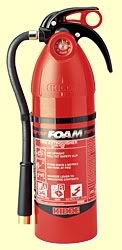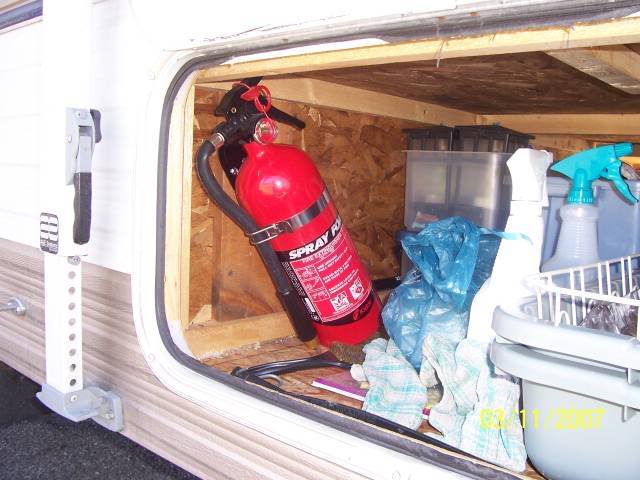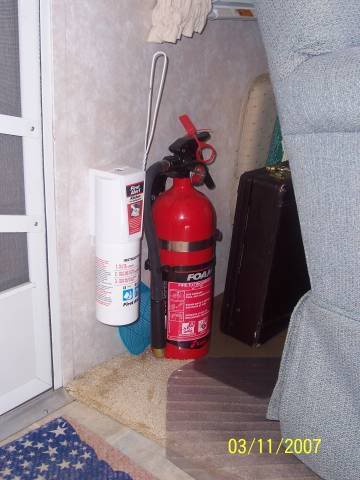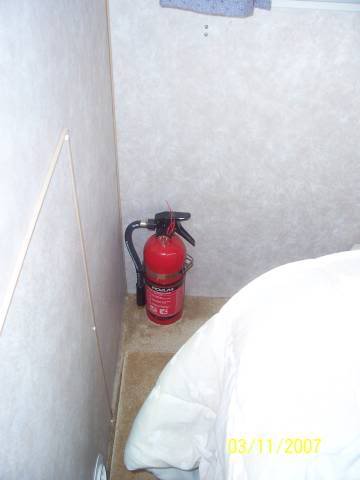Fellow Campers
We talk about so much, but fire safety we do not talk a lot on.
I'm not a fire fighter by trade and do not claim to be one. But when I bought my TT I did do extensive research on TT, fires and RV fire extinguishers to better educate myself as I knew I needed to learn some new things. If any fire fighters out there find anything wrong in what I state, please set me straight. This is a site to learn from, me included.
Below is a complied amount of info I have come up with. Most of these things are just realizing what can occur in an RV and to think in advance. A lot of us may not have really given a lot of this much thought, but maybe this post will start us to talk about it and we all think about it.
What would you do if a fire broke out?
What prevention system do you have in place?
Do you have a plan?
Some things to remember.
1. An RV is made of a lot of plastic or other synthetic parts. They burn hotter/faster than normal homes and the toxic fumes are deadly if you are inside.
2. In an RV, the spaces are very small. Fire doubles in size every 10 - 20 seconds. If flames are present the entire inside can be engulfed in 1 - 2 minutes. Once it's engulfed the fumes will knock you out and you will not get out.
3. Basically when a fire breaks out inside an RV, seconds is all you have. If you can act immediately before it grows, having on board good sized extinguishers may stop it or slow it down to get you out. If after 10 seconds, it's out of control, that it's get out and do not go back in. The case studies show every time someone goes back in, they do not come out.
4. If you have family in side, they have to get out first. Remember you only have "seconds' and after they are out it may already be too late to try to stop it. Fighting an engulfed RV fire is a no win situation unless the fire company is there. The fire extinguishers buys you only seconds to get out.
5. The best protection we as RV'ers have is
1st, education/practice on what to do/getting out. Make a plan with your family and practice it.
2nd, early detection, use more than 1 smoke alarm.
3rd, Carbon monoxide and propane detectors. Have them and test them often along with the smoke detectors. Replace batteries annually and date the battery. Seeing an over due date is a good reminder.
4th. Have many fire extinguishers and know how to use them, I have 4, 1 in galley, 1 in bedroom, 1 outside in unlocked compartment, 1 in truck and I only have a 26 foot TT.
6. At night I have in my pants next to the bed my camper keys and truck keys. No time to think where you put them last and they may be in the other end of the camper in the fire. Or if the fire is in the middle and your kids at the other end, opening the door from the outside for them to get out takes a key. Only if you have it.
7. I do most all cooking out doors unless weather is real bad. If you do cook indoors cooking grease or oil can be your worst enemy. Be careful. Having a large pot lid handy, “before” you start cooking to smoother out a pan fire can maybe save your camper.
8. Electric heaters or any other electric heat producing device, do not overload your camper. Most 30 amp campers can only handle 1 heat producing device at a time. 1 toaster, 1 hair dray, 1 heater, that is it. If they say 1100 to 1500 watts, one at a time.
9. On the propane and shore cord. Only time and exact circumstances fit here. If you are running out and the fire is smoking and not burning, you might have about 30 seconds to 1 minute to pull the line cord and turn off the propane. If the fire is next to the propane/electric, It's too late, get away as fast as you can.
10. When you come upon the rig that is burning in flames, it is already to late. Call the fire company and keeping others away as they do not understand RV fires and this is the only safe thing you could do. Even though it seems helpless.
11. The RV fire safety standards are different for pop ups verses hard sided campers. Neither have very fire resistant materials in them. The mini required BC rated fire extinguisher that comes with the camper is no where large enough for all your needs. Hopefully in years to come more will be done on better fire codes for RV's.
See here on PU story
12. Fire extinguishers. Educate your self on them, the different types and how to use them and how to maintain them. If you are using dry chemical ones, they should be monthly tuned upside down and tapped to loosen the powder. Bumping down the road can pack them hard inside even faster than normal. Once the powder hardens, they no longer work even is the gage reads OK.
Go to a class to be trained by a professional on how to use an extinguisher. If you happen to be at a RV rally see if Mac Mcoy is doing a RV fire safety presentation. If so, attend it, he is good. Here is a link:
Mac Mcoy web site with fire safety articles. I have spoken to him on the phone about certain type of fire extinguishers. This was before he had his site up and running and offer to the open public.
Through Mac Mcoy I have found an AB and C rated non conductive up to 250 volts, which is a Kidde Fire Out Foam extinguisher. These fire Out Foam extinguishers are a step up from the dry chem units. They are good from 4 deg F to 140 deg F so they will not work below zero.
Kidde PN 466620 This is just one place that offers them as I could find a link to the new head ones. I have found them for $39.00 as well.
They are non toxic and come in 2 liter size. The new ones have the C rating and a new re-chargeable head on them as shown in the link above. You may find
Older units not yet C ratedthat are only AB rated as the test was only recently available for the C rating. But it is now available. What is in side has not changed but the rating has. I bought mine at Home Depot and Anderson's General store. Mac Mcoy also has other foam units for sale on his web site.
Here is a pic of the new ABC rated one with the new looking head on it.

Due to my TT layout I have 4 extinguishers on board and 2 smoke detectors.
My mid bathroom cuts the TT in half. A smoke detector is out in the kitchen area and one in the bed room.
On the extinguishers, 1 is in the truck.
One outside in the front cargo hole. For when I’m outside and a fire breaks out.

One in the kitchen area.

One in the bed room area.

If the fire breaks out in the kitchen and we are in the bed room, I have one handy to use to help so we can get out. And this works for the other way around if the fire is in the bed room, I have one in the kitchen. Only having 1 small fire extinguisher on board while it meets current day code, does not cover many options a fire has in your TT.
You will noticed I talked about fire extinguishers helping you get out a lot. While the extinguisher is there to help you, it only buys you seconds and is the most effective if the fire just started. Once the fire is fully burning, the extinguisher will not help and we are not trained well enough to actually fight a fire. The camper is gone, get yourself and family out.
A fire fueled by a propane line most times has more energy in it then the little fire extinguisher we have in our hand trying to put it out. Use it to get out and that is all you can do.
Hope this helps
Others with more help, please join in.
John




























 Linear Mode
Linear Mode




